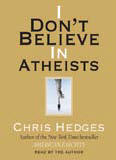Science: I Don’t Believe in Atheists
I Don’t Believe in Atheists
by Chris Hedges
Reviewed by Neil Earle
 Chris Hedges is a best-selling author, a graduate of Harvard Divinity School and a Pulitzer-Prize winning journalist. He is also the son of a Presbyterian pastor from Vermont. I Don’t Believe In Atheists (New York: Free Press, 2008) exposes two dangerous mindsets, both of which are trying to shape the debate about where America’s real interests as a nation lie.
Chris Hedges is a best-selling author, a graduate of Harvard Divinity School and a Pulitzer-Prize winning journalist. He is also the son of a Presbyterian pastor from Vermont. I Don’t Believe In Atheists (New York: Free Press, 2008) exposes two dangerous mindsets, both of which are trying to shape the debate about where America’s real interests as a nation lie.
The first dangerous mindset is that of the New Atheists. They are represented by culture critic Christopher Hitchens (God Is Not Great: How Religion Poisons Everything, 2007), evolutionist Richard Dawkins, and writer Sam Harris, author of The End of Faith (2004).
Hedges explains that these “militant atheists,” posing as religious experts, do not simply disagree with religious truth claims — they see them as evils. Dawkins openly mocks Christians who believe God had to kill his Son to atone for a talking snake who was pushing apples; Hitchens blames religion as the source of all world conflict, especially the tiny number of Muslim Jihadists; Harris pushes further and calls for a bombing run on Iran.
Hedges sees this as the reappearance of a kind of utopianism that the Western world has already experienced, most recently in the 1960s. But it is the very certainty of the New Atheists that alarms Hedges. “The nonbeliever will talk of religion as a blind man talks of color,” he retorts. Fanatics hate complexity. In essence, says Hedges, the New Atheists have succumbed to a form of fundamentalism perhaps more dangerous than the more well-known religious variety. Hedges sees both the religious and atheist fundamentalists — whether “blustering televangelists” or their cultural opposites — as pushers of “illusion and false hope.” These antagonists “each claim to have discovered the absolute truth…. They trade absurdity for absurdity…. They banter back and forth in predictable sound bites. They promise simple and seductive dreams.”
While Dawkins and Company hijack the concept of human evolution to elevate their brand of atheism to the level of true “progress,” Christian absolutists cling to their clichés of a kingdom to descend from heaven dealing death and terror to all but them. He explains: “Evil for the Christian fundamentalist and the atheists is not something within them but an external force to be vanquished.”
Hedges is not an evangelical Christian. He is more an old-style liberal humanist in the tradition of Erasmus or Albert Schweitzer. Some of his ideas are more than a little left of center. But he is on to something. As an experienced war correspondent who has confessed his own addiction to the “rush and excitement of battle,” he has something important to say about extremism, no matter from which direction it is coming.
Chris Hedges, I Don’t Believe in Atheists (Free Press, 2008), 224 pages. $25.
Copyright 2009
